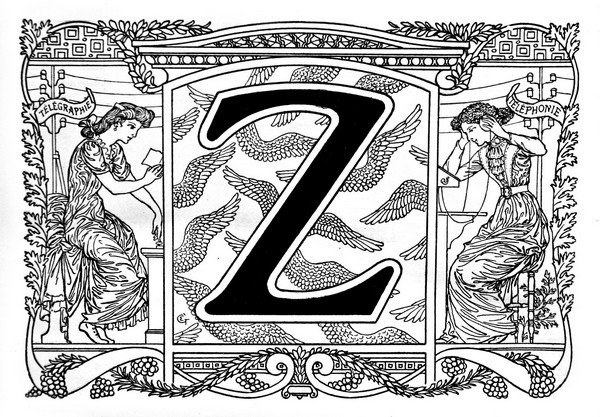
Ladies and gentlemen, this is pretty much over! Liederabend's alphabet comes to an end. Almost three years after that A is for amor, we're reaching letter Z.
As I said when we got to the letter X, finding a word for Z has been really difficult... I turned to my dictionary seeking inspiration and on the fourth and last page, when I had almost lost hope, I found a good possible option: 'zoològic'. The Catalan dictionary entry for 'zoologic' says something similar to this English definition for 'zoo':
An area in which animals, especially wild animals, are kept so that people can go and look at them or study them.
Could it be useful? Well, we have a few animals, not particularly wild, in fact. But people can come and listen to them. Somehow, it could match. So: Z is for zoo.
Then, I realized that the English dictionary includes a second meaning for 'zoo' that doesn't exist in Catalan:
A place where there are a lot of people and their behaviour is not well organized or controlled.
I really hope that Liederabend is not that kind of zoo! We'd better talk about animals. Actually, more than a zoo, we have an aviary. Birds can be found here and there in many poems. Singing happily, as in El cant dels ocells, turned into old memories as in Los pájaros perdidos or making their silence an essential part of the poem, as in Wanderers Nachtlied II. If we pay attention to the species, we have plenty of nightingales. That by Brahms, by Schubert or by Rimsky-Korsakov. Also by Mahler, sharing the song with a cuckoo alone or with a cuckoo and an ass. Another bird we’ve often met is the lark, and Brahms dedicates a gorgeous Lied to its singing. Brahms turns often to birds; a pair of doves make the poet cry in Die Mainacht. Not all our birds are small: we have the crow from Winterreise or Wolf's storks. And let me mention two implicit birds: eagles and our wonderful penguins.
Fishes, who would have thought it, also had their great moment; One of my favourite Lieder by Mahler is Des Antonious von Padua Fischpredigt, and I cannot forget a song by Schubert whose first words (by Goethe!) are: "I wish I were a fish". On the contrary, we hardly have mammals. A few horses as means of transport, as in Erlkönig; the ass I mentioned before, a goat and rats. To reinforce our humble zoo and, above all, to bring the rats under control, today, we're adding a cat. We even know its name: Pangur.
Hermit Songs is a song cycle by Samuel Barber composed from the English translations of poems written in Irish during the Middle Ages; the authors of those poems were most likely monks who would have written them secretly in the margins of the books they used to study or illuminate. I dread to think about the abbot's reaction if he got to know it. Barber chose nine poems from three different compilations. Most talk about religion, such as The Crucifixion, which we heard some time ago, but there are some who speak of everyday life, such as The monk and his cat. The monk reflects on how he and the cat are good pals that live and let live.
The composer chose this poem from The Silver Branch, a collection curated by writer Seán Ó Faoláin, published in 1938. For some reason, he didn't like the translation and asked WH Auden to write a new one. I came to know that Pangur Bán (its name in Gaelic, which could be translated by "White Fuller") is a very famous cat, born in the 9th century in the Abbey of Reichenau, in the Lake Constance. I don't know why the monk was so far from home, but, at least, that's where the manuscript containing the poem was found. A few translations exist and, as far as I could see, Auden's is the shortest; the rest have eight stanzas of four verses. Again, I don't know why but, in any case, that's the one that Barber musicalized.
The Hermit Songs were premiered October 30, 1953; the performers were Leontyne Price and Samuel Barber and the concert was broadcasted live on the radio and recorded. That recording was later edited and today, we're listening to The monk and his cat as its first listeners did. I hope you like the song; I'm not much of a cat person but I like the relationship (or the non-relationship) that the monk tells, as if meeting the cat from time to time was enough for not feeling lonely.
And the Liederabend's alphabet ends. Now I can tell you that I was a bit scared for such a long-term commitment; three years on the Internet seems like a life time! When I finished my first series, the ten saddest songs, I wrote a mental note: next one should be shortest because it took me too long. And then, I put together the 19 post series and a 25 post series. The next one will probably begin next month and will go back to ten posts and it might seem so short.
How happy we are
Alone together, Scholar and cat.
Each has his own work to do daily;
For you it is hunting, for me, study.
Your shining eye watches the wall;
My feeble eye is fixed on a book.
You rejoice when your claws entrap a mouse;
I rejoice when my mind fathoms a problem.
Pleased with his own art
Neither hinders the other;
Thus we live ever
Without tedium and envy.
Pangur, white Pangur,
How happy we are,
Alone together, Scholar and cat.